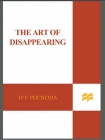The Art of Disappearing, Ivy Pochoda [best android ereader TXT] 📗

- Author: Ivy Pochoda
Book online «The Art of Disappearing, Ivy Pochoda [best android ereader TXT] 📗». Author Ivy Pochoda
On the second-floor landing, a dark hallway stretched in front of me. The house heaved and breathed. At the end of the hall, a door blew open. The magicians’ whispers stopped. I squinted at the column of light that leaked into the hall, and saw a bit of fabric fluttering through the open door. As it rose and fell, Asian music filled my ears.
Even in the low light, I knew how this silk would feel as it slipped across my skin—like cold-melt mercury. I pulled the door open and, with a creak of hinges and floorboards, entered a chilly bathroom with a claw-foot tub. On the back of the door was an exquisite silk robe. I stared, hesitating to lift it from its hanger. Its music filled my ears. I grabbed the robe and swung it around my shoulders. The music swelled, drowning out the night noises of the old house.
The robe was the color of air—the silver of the clouds and the almost imperceptible blue of thinnest sky. The front of the coat was embroidered with two golden dragons, and on the back, an enormous phoenix burst from multicolored flames. I ran my hand along the wall, looking for a light switch. With a click, a weak bulb flickered to life, illuminating the robe’s rich colors. I approached a mirror and lifted my arms above my head. The dragons shifted. Then I spun around and watched as the phoenix flew high above the fire. The music escalated as the robe prepared to carry me away.
“You’ve found the phoenix.” Piet stood in the doorway behind me. Even in old age, he possessed a talent for surprise.
“I’m sorry.”
“You’re finding it hard to sleep,” he said, placing a hand on my arm. “It’s not the jet lag.” He raised his white eyebrows. “It’s the secrets. It’s hard to sleep around secrets.”
“I thought I heard the robe calling me. From the hallway.”
“Did you?” Piet replied. Then he nodded. “Perhaps you did.”
I began to take the robe off. “I design fabric and textiles—and this silk, the music, its music, is unlike anything I’ve ever heard.”
“You hear music?” Piet asked.
I nodded and returned the robe to the hanger. Then the old magician placed his dry hand over mine. “No. It’s yours.” He tightened his grip. “I insist. This was from our end. From the moment when our magic stopped. If you hear music where I only see pain, you should keep it.”
“I couldn’t.”
“Please, a little souvenir to inspire you and Toby.”
I looked at the robe, suddenly unsure. “Thank you.” I draped the robe over my arm, exposing a label sewn inside the collar. “‘Made by Special Order by the People of the South,’” I read aloud. “For you?”
“Not for me. For Theo.” His words escaped from his lips, carried on uneven currents of breath. “His magic was the beginning and the end for us all.”
“But he no longer wants it?” I asked, running my hand across one of the phoenix’s wings.
“Theo?” Piet shook his head. “For him, the phoenix was a false friend. But that’s his story.”
The shadows in the hallway had shifted, smoothing themselves into benign shapes. “I sleep irregularly,” Piet said. “I can offer you some tea, provided we drink it the Dutch way—no milk and a little sugar.”
Still carrying the robe, I followed him to the kitchen.
I slept late the next day. When we finally left Piet’s house, the sun had vanished, leaving Amsterdam under the blanket of coal gray evening. At the end of his cobbled street, Piet stopped and leaned on his silver-headed walking stick. “Theo lives in our famous red-light district. He has been looking forward to your arrival.” He pulled up the collar of his overcoat. “We all are. It has been so long since someone joined us. Fifteen years is too long to spend in the company of the same faces. I think we fail to realize how old we’ve become.”
“No one new has come in fifteen years?” Toby asked.
“Some have left,” Piet replied. “Theo’s name shone brighter than any of ours. He brought us together to rekindle magic’s golden age. It almost happened. And then, it didn’t. Now, we are falling apart.”
Red lightbulbs framed the canal bridges, dyeing the water with suggestiveness. The women in the windows gyrated impassively, beckoned halfheartedly. Their bodies did the work—moving to music that was out of sync with the rhythm of the street. They perched on the edges of red leather stools, bursting the seams of their lingerie. Some yawned, some filed their nails, others chatted listlessly. The red lights appealed to me. I liked the uneven chain of the glowing windows that ran up and down the canals. I liked the red-bulbed arches under the canal bridges that disappeared into the distance like a row of open mouths. A modern-day Roman feast stretched along the district’s canals—slot machines, fast food counters, and bars filled the gaps between the famous windows. There was a guttural symphony of indulgence that accompanied the area—a bass clef composition of moaning, chewing, slurping, and the clink-clink of coins.
Toby’s face registered nothing as barkers called to us. He didn’t flinch as the scantily clad women tapped on their windows, inviting him in.
At the end of a covered, cobbled alley stood a white farmhouse unlike the narrow step-gabled buildings along Amsterdam’s canals. As we stood before the door, the noise of the district faded into an improbable silence. The house was set in a small courtyard filled with unruly vines. Opposite it stood a pair of matching carriage houses with splintering wood





Comments (0)